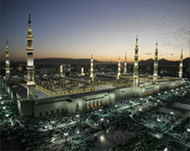Iran takes to the skies for Ramadan
Iran is using an aeroplane to spot the crescent moon to signal the start of the holy month of Ramadan as several other Muslim countries began fasting on Saturday.

A fatwa from the Ayatollah Ali Khamenei, the supreme leader of Iran, two years ago ruled that looking at the moon with technical aids was valid, prompting many people to start using telescopes.
This year, however, the authorities are taking the idea even further.
“Since seeing the crescent with an ‘armed eye’ was allowed by the supreme leader, this year, as the year before, we are going to use the best equipment and means available for our experts to spot the moon,” an official said. “And for the first time this year we are going to use the aeroplane.”
The weather, light pollution and smog can make moon-spotting difficult with the naked eye sometimes leading to different opinions over the beginning and end of the ninth month in the Muslim lunar calendar.
Last year, some religious leaders in the city of Qom announced the end of Ramadan one day before the office of the supreme leader.
Religious officials expect Ramadan in Iran to start on Sunday or Monday.
Fasting
The holy sites of Haram al-Sharif in Makka and the Mosque of the Prophet Muhammad in Madina, both in Saudi Arabia, began fasting on Saturday.
Religious authorities in Kuwait, Qatar and the United Arab Emirates also announced that Ramadan would start on September 24 after the new moon was spotted after nightfall.
Muammar al-Qadhafi, the Libyan leader, was quoted by the state news agency on Thursday as saying that Muslims should take their cue from “Libya’s correct Islam” and begin their fast on Saturday.
“People in Arab and Muslim countries are turning to Libya to know when Ramadan begins and ends because Libya is the state that observes the correct Islam without sects,” he said.
Lunar calendar
Islam follows a lunar calendar which means that the months of the year are measured according to the revolutions of the moon around the earth – each month begins with the sighting of the new moon.
 |
|
The sun sets over the Mosque |
Because the lunar calendar is approximately 11 days shorter than the solar calendar used elsewhere Islamic holidays are at slightly different times each year.
For more than one billion Muslims around the world Ramadan is a “month of blessing” marked by prayer, fasting, and charity.
Ramadan has special significance since it is the month in which Muslims show empathy towards the poor by practicing sawm, or fasting, eating and drinking nothing during daylight hours.
Meals
During Ramadan in the Muslim world, most restaurants are closed during the day. Families get up early for a light meal, called suhoor, eaten before the sun rises.
After the sun sets, the fast is broken with a meal known as iftar. Iftar usually begins with dates and sweet drinks that provide a quick energy boost.
Fasting serves many purposes. Self-discipline is one of the primary objectives of the fast in which all physical contact between husband and wife is also abandoned in daylight hours for the duration of Ramadan.
Fasting is one of the five pillars of Islam. The others are: belief in one God (Shahaadah); prayer (Salaah) – five times a day at its appointed times; alms-giving (Zakaat) – 2.5% of fixed assets annually; and pilgrimage (Haj) to Makka at least once in a lifetime.